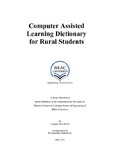| dc.contributor.advisor | Chakrabarty, Dr. Amitabha | |
| dc.contributor.author | Rasel, Annajiat Alim | |
| dc.date.accessioned | 2018-09-13T05:28:57Z | |
| dc.date.available | 2018-09-13T05:28:57Z | |
| dc.date.copyright | 2018 | |
| dc.date.issued | 2018-05 | |
| dc.identifier.other | ID 16266004 | |
| dc.identifier.uri | http://hdl.handle.net/10361/10472 | |
| dc.description | A thesis submitted in partial fulfillment of the requirements for the degree of Master of Science in Computer Science and Engineering of BRAC University, 2018. | en_US |
| dc.description | Cataloged from PDF version of thesis report. | |
| dc.description | Includes bibliographical references (page 42-46). | |
| dc.description.abstract | It is observed that rural students (the target demography) are falling far behind in the countrywide standard tests like SSC and HSC. As high as up to 80% of students from rural areas are failing in national English examinations due to lack of quality and extra-care received by urban students. Training up school and college teachers from one village at a time will take too long to achieve. Furthermore, the extra-care received by urban students like private tuition, the surrounding environment which uses English a lot would be too expensive. It would be almost infeasible to replicate the urban environment in rural areas.
English language skills are usually tested in four key areas, listening, reading, writing and speaking. Public examinations in Bangladesh only tests reading and writing skills. This is done in two parts through English 1st paper Examination and English 2nd paper Examination. These parts focus mostly on reading and writing skills respectively. Both of these skills heavily rely on stock vocabulary. Vocabulary stock depends on how much vocabulary students could learn by reading. On the other hand, being able to read requires some vocabulary. Due to limited vocabulary, it becomes difficult for the students to read and write in English. Sentence construction and being able to express in English is a more advanced task compared to reading. This work focuses on building vocabulary for academic reading for the English 1st part examination. The goal is to assist the rural students in acquiring sufficient vocabulary so that they can read the board book prescribed by the National Curriculum & Textbook Board (NCTB) as a Textbook.
The more words students know, the more they can read. On the other hand, the more they read the more words they will know. It appears to be a chicken and egg problem. Due to an extremely small size of vocabulary known by students from rural areas of Bangladesh, it becomes tough for them to increase their vocabulary size and to be able to read. It leads to nationwide failure in English examination in addition to Mathematics. This work investigates what approach student may follow to acquire more vocabulary to make their reading smoother.
Despite the availability of resources for this purpose, according to our investigation, no empirical research has yet identified the learning environments and the unique learning requirements of the target demography. This work aims to explore the possibilities of automated morphosyntactic tagging of the educational material for these courses and automated extraction of linguistic patterns from the tagged corpora. | en_US |
| dc.format.extent | 46 pages | |
| dc.language.iso | en | en_US |
| dc.publisher | BRAC Univeristy | en_US |
| dc.rights | BRAC University theses are protected by copyright. They may be viewed from this source for any purpose, but reproduction or distribution in any format is prohibited without written permission. | |
| dc.subject | Natural language processing | en_US |
| dc.subject | Corpus | en_US |
| dc.subject | Computational linguistics | en_US |
| dc.subject | Outcome-based education | en_US |
| dc.subject | Technology-enhanced learning | en_US |
| dc.subject | Lexicography | en_US |
| dc.title | Computer assisted learning dictionary for rural students | en_US |
| dc.type | Thesis | en_US |
| dc.contributor.department | Department of Computer Science and Engineering, BRAC University | |
| dc.description.degree | M. Computer Science and Engineering | |

